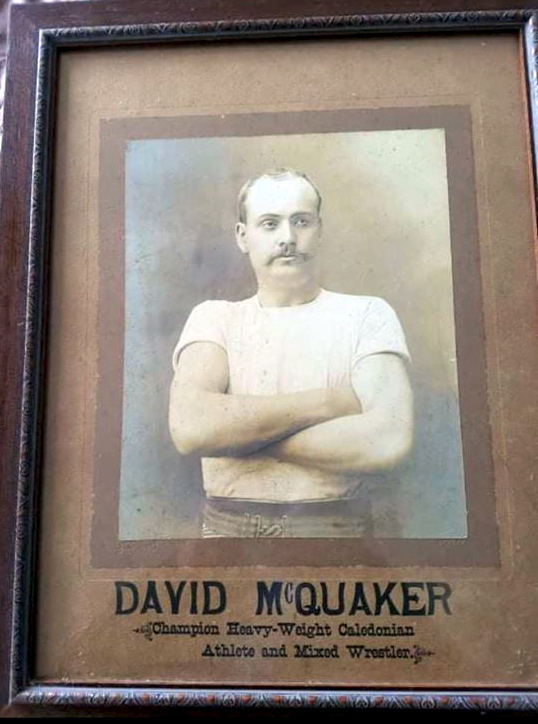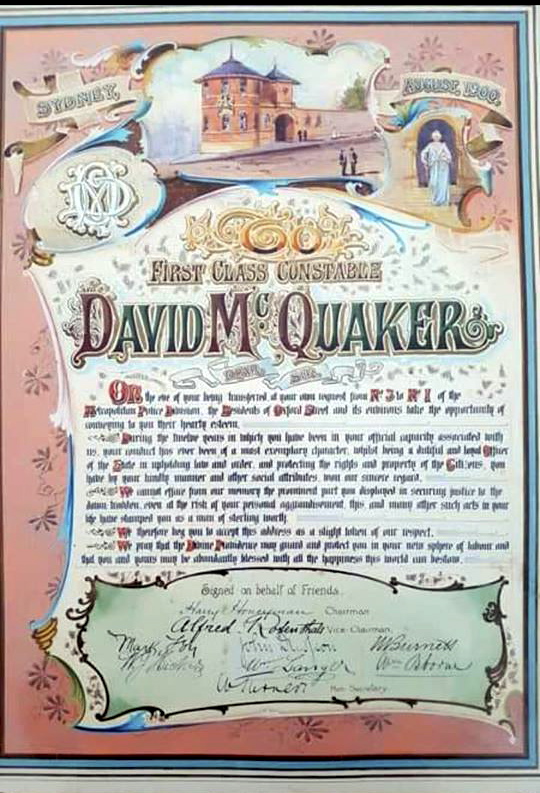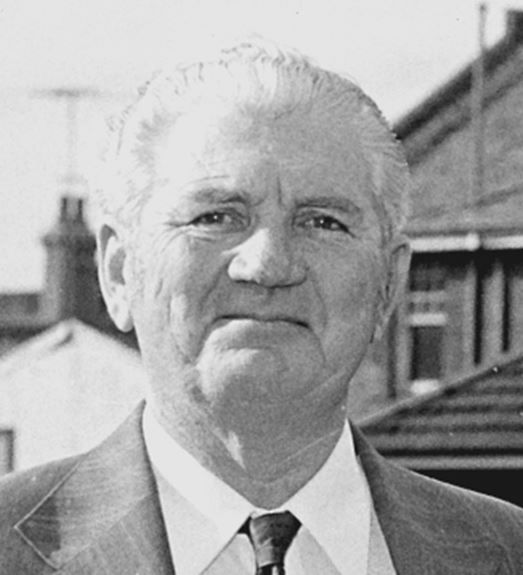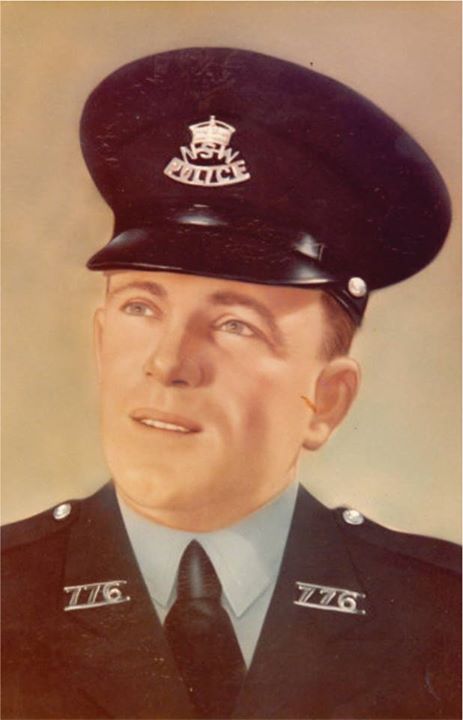David McQUAKER
David McQUAKER
AKA Mac
Late of ?
NSW Redfern / Penrith Police Academy Class # ? ? ?
New South Wales Police Force
Regd. # ‘ Q ‘ 5844
For the purposes of this website ‘Q‘ represents those Police joining between 1 March 1862 ( commencement of NSWPF ) – 23 February 1915 ( Commencement of NSWPF current numbering system )
Rank: Commenced Training on ? ? ?
Probationary Constable- appointed 30 July 1889
Constable – appointed ? ? ?
Constable 1st Class – appointed ? ? ? ( yes )
Detective – appointed ? ? ?
Senior Constable – appointed ? ? ?
Sergeant 3rd Class – appointed ? ? ?
Sergeant 2nd Class – appointed ? ? ?
Sergeant 1st Class – appointed ? ? ?
Final Rank = ?
Stations: ?
Service: From ? ? pre 30 July 1889? to ? ? ? = ? years Service
Awards: No Find on Australian Honours
Born: ? ? 1866 – Scotland
Emigrated to Australia: 21 July 1889, aged 23, upon the ship Garonne
Died on: ? ? ?
Age: ?
Cause: ?
Event location: ?
Event date: ?
Funeral date: ? ? ?
Funeral location: ?
Funeral Parlour: ?
Buried at: ?
Memorial / Plaque / Monument located at: ?
Dedication date of Memorial / Plaque / Monument: Nil – at this time ( May 2020 )
DAVID is NOT mentioned on the Police Wall of Remembrance *NEED MORE INFO
FURTHER INFORMATION IS NEEDED ABOUT THIS PERSON, THEIR LIFE, THEIR CAREER AND THEIR DEATH.
PLEASE SEND PHOTOS AND INFORMATION TO Cal
May they forever Rest In Peace
https://www.facebook.com/groups/AustralianPolice.com.au/
https://www.facebook.com/NSWFallenPolice/
https://www.facebook.com/groups/NSWFallenPolice/
Police Superannuation and Reward Fund.
The following members of the Police Force were retired on pensions amounting to £6,791 6s. 3d. per annum:—
Superintendent, 3rd Class Inspector… James KENNY
……..
Ordinary constable ……..David McQuaker.
annual_report_archive_1913 – document.pdf
Cumberland Argus and Fruitgrowers Advocate (Parramatta, NSW : 1888 – 1950), Wednesday 25 November 1903, page 2
WAS IT FLANNELETTE ?
On Monday, at Surry Hills, Sydney, the six-year-old daughter of Constable McQuaker was fatally burned.
In the morning the mother lit a fire under the copper in the yard, and shortly afterwards went out for a few minutes to do some shopping. Before leaving she left the little girl and another child in one of the rooms, taking the precaution to shut the kitchen door, to prevent the children getting to the fire.
In her absence, it is surmised, the children opened the door and began playing with the fire, for shortly after the mother had gone out the neighbours heard screams, and, on going in found the little girl enveloped in flames. The child died in St. Vincent’s Hospital.
https://trove.nla.gov.au/newspaper/article/85691992
Border Morning Mail and Riverina Times (Albury, NSW : 1903 – 1920),
Tuesday 24 November 1903, page 2
DEATH OF A POLICEMAN’S CHILD.
RESULT OF A BURNING ACCIDENT.
A child, six years old, belonging to Constable McQuaker, died today, as the result of a burning accident.
https://trove.nla.gov.au/newspaper/article/118737855
Cumberland Argus and Fruitgrowers Advocate (Parramatta, NSW : 1888 – 1950), Wednesday 14 October 1903, page 2
Accident to a Constables.
On Friday afternoon, Constable McQuaker, the well-known athlete of Sydney, was riding his bicycle down Wentworth – street, Parramatta, when, to avoid a collision with the kerbing at the foot of the street, he threw himself off the bicycle. He received a badly out hand, his wrist also being gravel-rashed considerably. He sought first-aid at Mr. H. Gwilliams’.
https://trove.nla.gov.au/newspaper/article/85684421
Sunday Times (Sydney, NSW : 1895 – 1930),
Sunday 22 May 1904, page 5
FOUND IN THE STREET WITH ARM CUT OFF.
A middle-aged man named Arthur Stevens, residing at 300 Upper Dowling street, Darlinghurst, was found by Constable McQuaker late last night in the roadway in Elizabeth-street, near King-street, with his left arm completely severed. The unfortunate man was admitted to Sydney Hospital in an unconscious condition. It is believed that, the injury was caused by a tram.
https://trove.nla.gov.au/newspaper/article/127800956
Daily Herald (Adelaide, SA : 1910 – 1924),
Saturday 26 August 1911, page 16
THE BEST EVER SAW.
FEATS IN THE WRESTLING RING.
THE AUSTRALIAN EX-CHAMPION TALKS.
CONSTABLE McQUAKER’S EXPERIENCES.
Constable David McQuaker, of the police force of New South Wales, is a man who in his day, which is not so far behind him as to permit of his being counted among the has-beens, was a world’s champion athlete ( says the Sydney “Sun”). Even now, when the hand of Time has busied itself to some extent, in thinning out the overgrowth of his head, he is one with whom the average man would hesitate about engaging in any argument of force. He stands 6 ft 4.5 in. from sock sole to scalp lock, and when in his best buckle tips the beam at 15 st. 10 lb-; was for three years in succession, prior to coming to Australia, in 1889, champion all-round athlete of the police and military of Great Britain and Ireland; and for ten years after his arrival in this State champion of all Australia. McQuaker is a more versatile athlete than was the late Duncan Ross, for, in addition to wrestling, at which he was for years unbeaten, he has a mile walk of 7m 7s. on grass at his credit, a fast quarter, light and heavy hammer throwing, caber tossing, putting the stone, and other feats of strength. His performances on the wrestling mat were has best athletic efforts and until he met his Waterloo in Ned Blackburn ( now of Newcastle ) he was considered one of the three best Cumberland wrestlers in the world. Blackburn was admittedly one of the best men who ever locked his hands behind the back of an opponent, and he said, after his defeat of McQuaker, that the constable was the strongest man he had met. Ned was a fine exponent of the Cumberland style, and he, not to be outdone in appreciation of the merit of his opponent, said if McQuaker had his ( Blackburn‘s ) knowledge of the science of the sport, and his own then present strength there was no man in the world at the time to stay five minutes with him in the ring at the Cumberland game.
The Match With Blackburn.
Blackburn could afford to be generous the man he defeated, for Ned was one of the best two-footed and two-hipped men Australia, at any rate, has ever seen in the ring. He was as good on one hip as the other, and as quick with his feet as Mace was with his hands, and if there was ever anything quicker in the ring than the hands of ” Gipsy Jim ” when he was busy in a bit of close in fighting mention of it has hot been given a place on the records of the P.R. In their engagement, Blackburn and McQuaker were all out all the time, and four falls had to be wrestled before the referee could give the decision which, practically, closed the career of the constable as a professional athlete. The first fall was to McQuaker, the second was a dog fall and did not count, and the third bout was one of the biggest things ever seen on the mat in this country. For 15 minutes two of the strongest men in Australia, were in holds, and then the constable went down to as pretty and tricky a bit of fancy footwork as one could wish to see, and the second fall was to the man from the coal country. If either of the contestants could be induced to describe the match he would say the final tussle was ” the best he had ever seen. ” From the time they clinched till they broke, after the fail, they were together 33 minutes, and for the whole of the time every muscle and sinew was busy, and every ounce of strength and every trick of the game was employed in the effort to bring the other man down. It was a tussle of giants, for at the time McQuaker was the biggest man in the Olympian games of the country and, as has been said, his opponent was the cleverest Cumberland wrestler – the cleverest by long odds – who had ever been in Australia. The final fall went at the end of the half-hour, to Blackburn, and neither afterwards engaged in public in any match of importance. There is no doubt as to the qualify of the men, for prior to engaging Blackburn, McQuaker had defeated Harry Donohue a man who had travelled the world on his reputation as a Cumberland wrestler in two meetings in private.
Asked to say something of the best match he had witnessed, Constable McQuaker was slow to speak :-
” I thought a good deal of a match I saw between Bob Scott, of New Zealand, and Buttan Singh, the Indian. Scott weighed 15 st. 7 lb., and stood my height, 6 ft. 4.5in. The Indian stood 5 ft. 10 in., and weighed 15 st. This was a catch-as-catch-can -wrestle, and there was a lot of good work on both sides, though Scott won with two straight falls and a bit in hand at the finish.
Eighteen-Stoners in Holts.
” But the best match I remember was in the old country about five and twenty years ago, while the great Scottish international Exhibition was on (1887). Among the wrestlers there on the day of the match for the Cumberland style championship were some of the best men from all parts of Great Britain. Of the whole number the three who remained in for the final were the finest men I have seen. Currie, the Scotch clogger, who was defeated by the men who wrestled off for the event, was a man of 5 ft. 11 in., and weighed 17 st, 10 lb. Joe Stedman, who was the eventual winner, was 5 ft. 10.5 in., and, in condition, weighed 18 st 7 lb.; and Joe Lowden, his opponent in the final, was 6 ft, and weighed 18 st. in wrestling form. Big men, weren’t they? ” And McQuaker‘s eyes kindled as he recalled the fact that with such giants of the arena he had while still a youth, measured his strength and come through without discredit.
” Stedman was the champion of the world in Cumberland style, and though he certainly met the next best man in Lowden, the result of the meeting was not long in doubt when they took hold. But it was a fine sight to see them at work, two strong men, men of strength far and away above the ordinary, each aware of the cleverness of the other, and each well knowing that the first mistake made in grips would be the last.
The Cumberland Game.
” You know the Cumberland play? All the work is from the hips and with the feet. That is where Blackburn was so dangerous a man; he could ‘hipe’ from either hip, and in a second would have a man off one hip and across the other, and then, if the opponent was not quick to alter his defence it was a million to one he would be standing on his head, wondering just where the stroke came from that upset him so much. When he reversed me in the first fail he got against me I did not know till I was down that he had got me on the other hip, and I have put in a lot of spare time since wondering how he managed to get me there.
” I can see Stedman and Lowden now just as plainly as I saw them in the ring that day 25 years ago. Nearly 40 stone of meat and muscle they made between them, and I have never seen a finer sight than I saw in the few minutes they were together. The natural thought when one speaks of an 18 st. man is of fat, but there was no fat to speak of on those men, and nothing in the way of waste flesh ; they were absolutely fit, as they had to be in view of their contests for the title of champion of the world. I am no weakling, and was a man who counted even in that class of athletics, but they were better men than I – and I, he continued modestly enough, and more with the intention of glorifying his idol of the man Stedman, ” hold some world’s records for handling heavyweights and throwing the caber. It was grand to see them in grips ( in Cumberland wrestling the grip, once taken, must not be broken till one of the contestants is down – the man who breaks loses the fall ), their hands locked, and every muscle strained to its fullest as they swayed and swung, each trying to find the unbalanced foot or the unwary body movement of the other. Lowden used his advantage in inches to the best purpose. He was longer in the leg and seemingly as quick as Stedman, and his work from both hips and the feet was fine. But Stedman was a general of the mat ; he had been there before, many and many a time, with the best in the counties of England and the pick of the lowlands of Scotland, and such a thing as catching him nodding was not on the cards. These strong men handled each other like acrobats handle their working partners on the stage.
There was ease and grace in every movement of their big bulk of manhood, and from hips downwards there was action such as would not he considered ungraceful in a ballroom, for the feet of the masters of the Cumberland style move as quickly and as lightly as those of girls in a dance.
WRESTLING MORE STRENUOUS THAN BOXING.
” A three-minutes’ bout in the boxing ring if the pace is fast and the men willing makes the sound of the bell welcome to both, and in my opinion three minutes on the wrestling floor when two good men are engaged is more trying than three minutes with the gloves, for the reason – especially in the Cumberland play – that the men are at work all the time, and their muscular strain is at the highest tension, for the whole term of the lock until it is broken. Stedman was a man like Ned Blackburn in his wonderful work from either hip, and it was in the use toe made of this part of his body that he distanced all who entered the ring with him. Though this match was the one which, in my opinion, was the finest possible of being put on the carpet of any country in the world, the first fall went to Stedman in five minutes ; but they were five busy minutes for both men. There were times when Lowden seemed to be in a good position to account for Stedman, for more than once it seemed he had the lock on, and there was no way out of a hold which few men would have known the way to break ; but with that quick motion of the hip and his fine footwork Stedman invariably got out of danger, and in the end of the first engagement he spun out of a tight leg hold and threw Lowden a fair four-point fall. I did not expect to see anything better in wrestling, and considered the next bout a foregone conclusion from the time the men took hold. As in the first meeting Lowden used his height, and stood wide, to keep his feet out of the way while he was doing the good work with his shoulders and hips. He did not care to place his feet within easy reach of the tricky toes of the champion, and it made the wrestling slower than in the first engagement.
But Stedman had got the measure of his man, and let him play his own way for the first few minutes of the struggle, and there is no doubt Lowden did some of the best work he had ever shown in Scotland in his efforts to put the cross-buttock on. But he was in the grip of a man who knew every wrinkle in the game, and at the end of seven minutes Stedman got him just as he was easing up after a long and straining attempt to make the score even, and the bout was ended. Lowden‘s head was where his feet were a second before, and the championship of the world was in the keeping of the best man in the world then or before or since – in Cumberland wrestling.
” I am counting Ned Blackburn out in saying this,” concluded McQuaker gravely. ” At that time I had not seen him. I would not like to say he was better than Stedman in his best day, but I would like to have seen them in grips 20 years ago. ”
https://trove.nla.gov.au/newspaper/article/105331431
McQuaker of No. 2 Police
Cries of “Murder! Police!” attracted the attention of Senior Constable McQuaker, of No. 2 Police Station, Chippendale, ( Regent St ) about 1am yesterday. He noticed a fellow bending over an elderly man and attempting to rob him. After the culprit beat a hasty retreat, McQuaker shouted a warning and fired his revolver three times. Despite being hit by the third bullet, the man managed to escape.
The Bulletin
Saturday 3 July 1897 Page 20
Constable McQuaker, who helped to look after Butler during the trial, is about the biggest man in the N.S.W. Force, and as good tempered as he is strong ; he was considered no end of a wrestler in the Old Country.
The first capture McQuaker made after joining the Sydney police was a typical five-foot 8 stone larrikin.
Mac, was leading him along by the collar, when the little ‘un wrenched himself free, and catching the big man by the legs, flung him clean.
The giant was so flabbergasted when he rose that he stood awhile speechless, looking at the midget, who did not attempt to bolt.
” Well, I didn’t think there was a man in Australia could put me fair on my back, and that did it. I’m sorry, my boy, I have to take you along. I’d really like to let you go. ” And when before the courts he told the story, and asked the bench to let the prisoner down easy.
https://nla.gov.au/nla.obj-672369238
Daily Telegraph (Sydney, NSW : 1883 – 1930),
Thursday 5 December 1895, page 1
DEATHS.
McQUAKER.— On the 4th inst., at 53 Marshall St., Robert McClelland McQuaker, son of Constable McQuaker, aged 7 months.
Truth (Sydney, NSW : 1894 – 1954),
Sunday 9 December 1894, page 5
A Park Prowler.
Alexander Jones, a well-known thief, was cleverly caught on Friday night by Sergeant Sullivan and Constable McQuaker. Jones made it a business to prowl about Hyde Park and rob drunken men who had been overcome and were sleeping on the grass.
Sullivan watched him closely, and at last caught him in the act. Jones got away at first but the officers pursued and arrested him. Mr. Smithers, S.M., remarked that he was determined to deal severely with such thieves, and sent the prisoner to gaol for three months.
https://trove.nla.gov.au/newspaper/article/167955017
National Advocate (Bathurst, NSW : 1889 – 1954),
Monday 26 March 1894, page 3
THE POLICEMAN’S REVOLVER.
CONSTABLE McQUAKER’S PRESENCE OF MIND.
A sensation policeman’s revolver incident is reported from Sydney. On Friday, whilst Constable McQuaker was attempting to handcuff a man whom he had downed, the desperado’s mate, advancing behind, slipped out the officer’s revolver.
Fortunately the movement was felt by the constable, who, with great presence of mind, turned round suddenly, and striking the thief full in the face, placed him in a similar position to his friend. The pistol was knocked out of the man’s hand.
https://trove.nla.gov.au/newspaper/article/156611388
More information available.




David Mcquaker arrived from Scotland age 23 21st July 1889
Ship Garonne
Thanks Kerry,
Memorial Post updated.
Cal